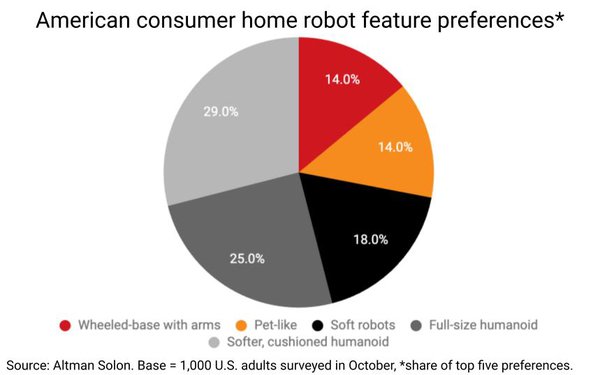
- A robot may not injure a human being or,
through inaction, allow a human being to come to harm.
- A robot must obey the orders given it by human beings except where such orders would conflict with the First
Law.
- A robot must protect its own existence as long as such protection does not conflict with the First or Second Law.
The good news for humans is
those are the three laws of robotics. The bad news is they are fiction.
Specifically, they are science fiction -- conceived by author Isaac Asimov as part of his groundbreaking 1950 book, I,
Robot -- but I think many humans believe they exist as actual laws.
That could ultimately prove a problem for humanity, but in the near term, it appears to be a problem for consumers, a plurality of which do not
want the robotics industry to market the kind of full-size humanoid robots popularized in pop culture movies or now -- in real life -- by marketers like Tesla's Elon Musk, or a number of competing startups.
advertisement
advertisement
Just a couple of
weeks ago, Norwegian startup 1X Technologies rolled out NEO, a humanoid robot for homeowners priced at just $20,000. That's still more than most consumers are willing to shell out, according to new
research from strategy consultant Altman Solon, which surveyed 1,000 consumers and found the sweet spot price point was well under $10,000, although 25% said they wouldn't buy a robot at any
price.
But NEO has something else going for it. While a full-scale humanoid, NEO's features are soft and cushiony, which is something Altman Solon's research found consumers are most
interested in.
As opposed to Musk's Optimus, which looks like it might have stepped -- make that leapt -- our of cinematic version of Asimov's I, Robot.
"About 50% of
respondents were concerned about the safety of having a human-sized advanced robot in their home," the Altman Solon research report notes, adding, "However, consumers mentioned design and safety
levers that would increase their comfort."
In other words, while the laws of robotics may not be real, the
immutable laws of marketing are. In which case Musk might want to tone down his humanoid "army" rhetoric, even if his trillion dollar pay package is directly tied to it.